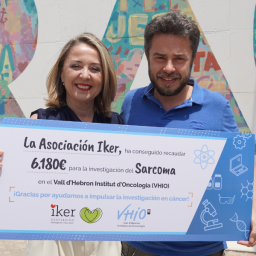
- Blood-based circulating tumor DNA analysis of plasma samples from patients enrolled in the open-label, randomized phase III VOYAGER clinical trial show that ctDNA sequencing can predict cancer drug response and resistance in metastatic gastrointestinal stromal tumor based on the detection KIT/PDGFRA mutations that are present in between 75%–80% of GISTs.
- Recently published in the journal Annals of Oncology (1) this VHIO-directed study is the first to evidence that ctDNA in blood captures the mutational landscape and therapeutic activity in pretreated patients with refractory GIST.
The advent of liquid biopsy as a powerful diagnostic tool enables the more precise, non-invasive real-time tracking and ‘policing’ of tumors, and is increasingly stepping up across various tumor types in better guiding clinical decision making. Representing an important advancement in more effectively combatting cancer, blood-based circulating tumor DNA (ctDNA) analysis can more precisely capture the molecular makeup of malignancies.
Recently published in Annals of Oncology (1)—the flagship journal of the European Society for Medical Oncology (ESMO)—results of a study led by César Serrano, Principal Investigator of the Vall d’Hebron Institute of Oncology’s (VHIO) Sarcoma Translational Research Group, have now extended the clinical utility of liquid biopsy in pretreated patients with advanced gastrointestinal stromal tumor (GIST).
GIST is a rare type of soft tissue sarcoma. Given the rarity of these tumors, molecular insights into GIST are limited. To date, few genes have been identified as relevant determinants of patient outcomes, tumor evolution, and as therapeutic drug targets. Furthermore, previous clinical studies have focused on early stages of disease or have been performed in patients who have received few prior lines of therapy. Achieving a deeper understanding into how these tumors evolve has also been limited since both the development of GIST and the exposure to therapies lead to mutations than can drive cancer drug resistance.
“Between 75% and 80% of these patients harbor mutations in the KIT gene and approximately 10% present with mutations in the PDGFRA gene. Alterations in both genes promote cancer growth in patients with KIT- or PDGFRA-mutant GIST,” observes César Serrano, Medical Oncologist at the Vall d’Hebron University Hospital (Vall d’Hebron Barcelona Hospital Campus), and corresponding author of this present study.
Imatinib—a type of cancer growth blocker called a tyrosine kinase inhibitor (TKI)—is the standard first-line treatment for GIST and achieves a response in up to 80% of patients presenting with these mutations. Most of these patients will however acquire cancer drug resistance through new mutations in these genes.
“Resistance mutations in KIT and PDGFRA can predict the activity of drugs that are used after failure with imatinib. The objective of our study was to identify these alterations in real time during tumor development in order to better guide clinical decision making based the evolution of disease,” explains Serrano.
The investigators performed blood-based ctDNA analysis in samples collected from 476 patients enrolled in the open-label, randomized phase III VOYAGER trial that evaluated the efficacy of tyrosine kinase inhibitors (TKIs) avapritinib versus regorafenib in patients with KIT/PDGFRA-mutant advanced GIST who had received prior treatment with imatinib and 1 or 2 other TKIs.
“The VOYAGER study did not meet its primary endpoint of progression-free survival since both TKIs showed very similar activity. We analyzed the ctDNA samples of 476 patients collected in this study—a large sample size considering the rarity of these tumors—to validate the utility of ctDNA analysis in plasma by liquid biopsy and investigate if the molecular profile of GISTs could determine the activity of these drugs,” adds César Serrano.
They identified mutations in up to 86% of these patients and have thus validated the utility of liquid biopsy as a powerful diagnostic tool in this setting. This is the first study to evidence that ctDNA mutation profiling in plasma samples captures the mutational landscape and therapeutic activity in pretreated patients with metastatic imatinib-refractory GIST, results of which were previously selected to first outing as an oral presentation at the American Society of Clinical Oncology’s Annual Meeting 2022 (2).
The investigators also verified that there are a significant number of mutations implicated in the development and evolution of GIST patients, and that liquid biopsy technology can expose genetic alterations as predictors of drug sensitivity in real time.
“We have also identified the most prevalent mutations; 25% of which had not previously been described, and observed that 17% of patients harbored four or more mutations, underpinning the additional level of complexity of disease observed in one in five of these patients,” concludes Serrano.
###
References:
- Serrano C, Bauer S, Gómez-Peregrina D, Kang YK, Jones RL, Rutkowski P, Mir O, Heinrich MC, Tap WD, Newberry K, Grassian A, Shi H, Bialick S, Schöffski P, Pantaleo MA, von Mehren M, Trent JC, George S. Circulating tumor DNA analysis of the phase III VOYAGER trial: KIT mutational landscape and outcomes in patients with advanced gastrointestinal stromal tumor treated with avapritinib or regorafenib. Ann Oncol. 2023 Apr 25:S0923-7534(23)00148-5. doi: 10.1016/j.annonc.2023.04.006. Epub ahead of print.
- Circulating tumor DNA (ctDNA) analyses of the phase III VOYAGER trial: KIT mutational landscape and outcomes in patients with advanced gastrointestinal stromal tumor (GIST). Cesar Serrano, Sebastian Bauer, David Gómez-Peregrina, Yoon-Koo Kang, Robin L. Jones, Piotr Rutkowski, Olivier Mir, Michael C. Heinrich, William D. Tap, Kate Newberry, Alexandra Grassian, Stephen G. Miller, Hongliang Shi, Patrick Schöffski, Maria A. Pantaleo, Margaret von Mehren, Jonathan C. Trent, and Suzanne George. J Clin Oncol. 202240:16_suppl, 101-101.

















